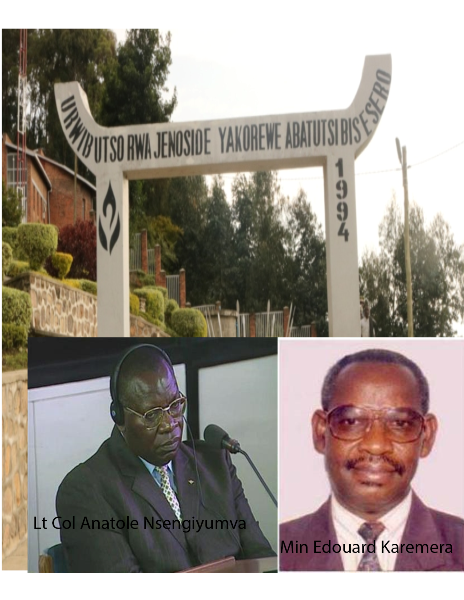
By Dr BIZIMANA Jean Damascène*
Kigali, June 18 (RNA) – The Government meeting of June 17, 1994 decided that the Tutsi of Bisesero should be killed as soon as possible, and that measures be taken to protect the infrastructure in the Bisesero region. The execution of such massacre was accelerated as much as possible by the KAMBANDA Government and its troops.
1. LIEUTENANT COLONEL Anatole NSENGIYUMVA WAS INSTRUCTED TO SEND TROOPS TO KILL TUTSI IN BESESERO
On June 18, 1994, the Minister of interior and Communal Development, Edouard KAREMERA, from Mwendo Commune in Kibuye, wrote a letter explaining how the killing of Tutsi in Bisesero should be carried out.
Minister KAREMERA wrote to the Commandant of army in Gisenyi Prefecture, Lieutenant Colonel Anatole NSENGIYUMVA, informing him of the operation to kill Tutsi in Bisesero in the following words:
“To the Commandant of the army,
I would like to inform you that during the cabinet meeting of this Friday, June 17, 1994, the Government decided to ask the Commandant of Gisenyi operational Sector to support the Gendarmery in Kibuye and the local population in the operation in the Bisesero sector of Gishyita Commune, which had become the RPF haven. The Government requests that this operation be completed by the end of June 20, 1994.
In the absence of the Minister of Defense who is on a mission abroad, the Minister of Interior and Communal Development had been mandated to inform you this decision and to ensure its follow up.
The prefect of the Kibuye Prefecture and the Commandant of Kibuye army Grouping copied in this letter are required to follow up on the pre-requisites to facilitate the implementation of this operation in the prescribed deadlines.”
The authorities who received the copy of the letter were the following: The Prime Minister Jean KAMBANDA, Minister of Defense Augustin BIZIMANA, Prefect of Kibuye Dr Clement KAYISHEMA and Commander of the Gendarmery in Kibuye Major Jean Baptiste JABO.
Let us recall that the Minister of Defense Augustin BIZIMANA was on a mission in Cameroon, and his interim was Colonel Theoneste BAGOSORA who also led the Genocide activities related to the Ministry of Defense.
It means that these authorities have been tasked with implementing the government plan outlined in the KAMBANDA Government’s meeting resolution of 17 June 1994 calling for the killing of Tutsi in Bisesero.
2. Edouard KAREMERA’S LETTER IS AN INDICATION OF THE GOVERNMENT ROLE IN THE PREPARATION AND IMPLEMENTATION OF GENOCIDE
The words used in this letter from Minister KAREMERA are enough to make it clear that the massacre of Tutsi was planned and led by the Government through its forces and authorities at various levels including youth of Interahamwe and Impuzamugambi. It undeniably shows that the Genocide against the Tutsi in Rwanda was a government organized killing. That is why various ministers of the KAMBANDA Government have been arrested and tried by international justice and many of whom have been convicted of genocide and crimes against humanity.
The convicts of the International Criminal Tribunal for Rwanda (ICTR) were as follows:
The Prime Minister Jean KAMBANDA, Minister of Local Government and communal Development Edouard KAREMERA, Minister of Finance Emmanuel NDINDABAHIZI, Minister of Planning Augustin NGIRABATWARE, Minister of Information Eliezer NIYITEGEKA, Minister of higher Education and Research Jean de Dieu KAMUHANDA, Minister of family Pauline NYIRAMASUHUKO, Minister of Youth and Organizations Callixte NZABONIMANA.
As for the Minister of Justice, Agnes NTAMABYALIRO was convicted of genocide crime by the justice system in Rwanda.
Others convicted of genocide in the International Criminal Tribunal for Rwanda (ICTR) as evidence of the government’s role in planning and carrying out the massacre of Tutsi, included the following senior officers: Colonel Theoneste BAGOSORA, Colonel Tharcisse RENZAHO, Colonel Aloys SIMBA, Colonel Ephrem SETAKO, Lieutenant Colonel Anatole NSENGIYUMVA, Lieutenant Colonel Alphonse NTEZIRYAYO, Lieutenant Colonel Tharcisse MUVUNYI, Major Aloys NTABAKUZE, Captain Ildephonse NIZEYIMANA, Lieutenant Ildephonse HATEGEKIMANA, Lieutenant Samuel IMANISHIMWE.
Major Bernard NTUYAHAGA was also convicted of genocide by the Brussels court in Belgium and Captain Pascal SIMBIKANGWA was convicted of genocide crime by the Paris court in France.
Others convicted with genocide crime by the ICTR include senior government officials, including: Callixte KALIMANZIRA, Director General in the Ministry of interior and communal development, Jean Bosco BARAYAGWIZA, Director General of the Ministry of Foreign Affairs, Matthew NGIRUMPATSE, President of the MRND Party at the national level, Francois KARERA the prefect of Kigali Ngali, Sylvain NSABIMANA the prefect of Butare, Clement KAYISHEMA the prefect of Kibuye, Dominique NTAWUKURIRYAYO the sous prefect of Gisagara, SEMANZA Laurent the Bourgmestre of Bicumbi commune, RUGAMBARARA Juvenal who replaced SEMANZA, Paul BISENGIMANA, Bourgmestre of Gikoro, Joseph KANYABASHI Bourgmestre of Ngoma, Elie NDAYAMBAJE Bourgmestre of Muganza, Juvenal KAJELIJELI Bourgmestre of Mukingo, Jean Baptiste GATETE Bourgmestre of Murambi Commune, Sylvestre GACUMBITSI Bourgmestre of Rusumo and Jean Paul AKAYESU, Bourgmestre of Taba.
Ladislas NTAGANZWA, former Bourgmestre of Nyakizu, was transferred by the ICTR to be tried by Rwandan courts and was convicted of genocide crime and sentenced to life imprisonment.
Other convicts of the Genocide by the International Criminal Tribunal for Rwanda include religious people: Father Emmanuel RUKUNDO and Father Athanase SEROMBA who ordered the demolition of the Nyange Church on Tutsi who had taken refuge in the church. These cases clearly show that all administrative levels carried out the genocide, emphasizing that the Genocide against the Tutsi is a crime planned and carried out by the government. (End).
* Dr BIZIMANA Jean Damascène, Executive Secretary National Commission for the Fight against Genocide (CNLG).
